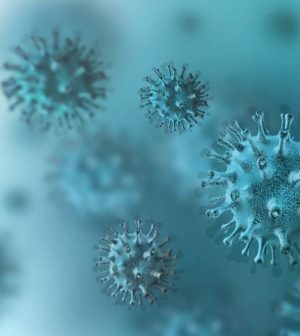- Could Your Grocery Store Meat Be Causing Recurring UTIs?
- Are You Making This Expensive Thermostat Error This Winter?
- Recognizing the Signs of Hypothyroidism
- 10 Strategies to Overcome Insomnia
- Could Artificial Sweeteners Be Aging the Brain Faster?
- Techniques for Soothing Your Nervous System
- Does the Water in Your House Smell Funny? Here’s Why
- Can a Daily Dose of Apple Cider Vinegar Actually Aid Weight Loss?
- 6 Health Beverages That Can Actually Spike Your Blood Sugar
- Treatment Options for Social Anxiety Disorder
No Sign Latest COVID Variant Leads to Worse Symptoms

JN.1, the COVID variant sweeping the country this winter, is not prompting more severe disease than earlier variants did, early U.S. government data suggests.
While it does not appear to be more deadly than its predecessors, the JN.1 variant has surged in recent months and now accounts for 85.7% of all U.S. cases, according to the U.S. Centers for Disease Control and Prevention.
The agency is waiting for additional data to craft a more detailed analysis of JN.1’s impact this season, Dr. Eduardo Azziz-Baumgartner, chief of the global influenza branch in CDC’s Influenza Division, said during a webinar with testing laboratories hosted by the agency this week, CBS News reported.
Asked if JN.1’s symptoms seemed to be more severe than earlier COVID waves, he said, “There are early signals that that may not be the case,” based on electronic medical records and other data.
He added that a virus’ effect on an individual can vary widely, however. “It could be very severe. People could die from a virus that, to the general population, may be milder.”
The CDC plans to release more details about JN.1’s severity “during the next couple weeks” as more data is gathered on the variant, Azziz-Baumgartner added.
Still, the CDC and other federal health agencies have not moved to deem JN.1 a variant of interest, even though the World Health Organization did just that last month.
But the WHO also said last Friday that there were “currently no reported laboratory or epidemiological reports” linking JN.1 to increased disease severity.
The CDC’s experts also reported earlier this month that hospitalization rates appeared to be lower than they were last season.
Azziz-Baumgartner cautioned that data lags could be muddying the picture, and officials have also been watching for any renewed spike in the spread of the flu.
Some regions have also been reporting a strain on hospitals, especially in New England, he added.
Just last week, Massachusetts General Hospital warned it was taking steps to address an “unprecedented overcrowding” crisis, along with other hospitals in the state.
More information
The U.S. Centers for Disease Control and Prevention has more on COVID.
SOURCE: CBS News
Source: HealthDay
Copyright © 2026 HealthDay. All rights reserved.










